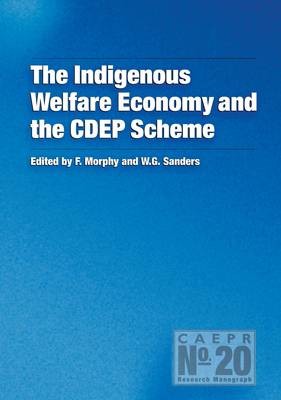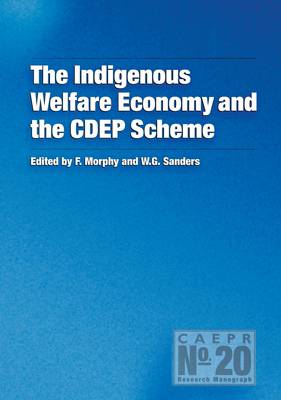
Je cadeautjes zeker op tijd in huis hebben voor de feestdagen? Kom langs in onze winkels en vind het perfecte geschenk!
- Afhalen na 1 uur in een winkel met voorraad
- Gratis thuislevering in België vanaf € 30
- Ruim aanbod met 7 miljoen producten
Je cadeautjes zeker op tijd in huis hebben voor de feestdagen? Kom langs in onze winkels en vind het perfecte geschenk!
- Afhalen na 1 uur in een winkel met voorraad
- Gratis thuislevering in België vanaf € 30
- Ruim aanbod met 7 miljoen producten
Zoeken
The Indigenous Welfare Economy and the CDEP Scheme
€ 72,95
+ 145 punten
Omschrijving
In recent debates about the Indigenous welfare economy, the Community Development Employment Projects (CDEP) scheme has not been given the attention it deserves. It represents a major adaptation of the Australian welfare system to the particular social and economic circumstances of Indigenous people. Part I of this volume contains overview papers which place the CDEP program in its wider cultural, sociopolitical, and economic contexts. The contributions in Part II address policy and policy-related issues which impact directly, or indirectly, on the structure and function of the CDEP scheme as a whole and of individual CDEP projects. Part III presents research based case-studies of particular CDEP projects in their regional contexts, drawn from the Northern Territory, South Australia, and Victoria. Part IV consists of short case studies, from the perspective of the participants themselves, of a number of CDEP organisations. These case studies provide an important perspective, taking up and providing a grass-roots view of many of the broader policy themes and concerns that are discussed elsewhere in the monograph. The crucial issue, addressed by many of the contributions, is how Indigenous self determination and the rights agenda, which argues for the unique and inherent rights of Indigenous Australians, will sit with (or in opposition to) the 'mutual obligation' of the Howard government's welfare reform. The volume thus represents a contribution to an ongoing and important debate in current Australian social policy.
Specificaties
Betrokkenen
- Uitgeverij:
Inhoud
- Aantal bladzijden:
- 266
- Taal:
- Engels
- Reeks:
- Reeksnummer:
- nr. 20
Eigenschappen
- Productcode (EAN):
- 9781920942045
- Verschijningsdatum:
- 1/05/2004
- Uitvoering:
- Paperback
- Formaat:
- Trade paperback (VS)
- Afmetingen:
- 176 mm x 250 mm
- Gewicht:
- 607 g

Alleen bij Standaard Boekhandel
+ 145 punten op je klantenkaart van Standaard Boekhandel
Beoordelingen
We publiceren alleen reviews die voldoen aan de voorwaarden voor reviews. Bekijk onze voorwaarden voor reviews.








